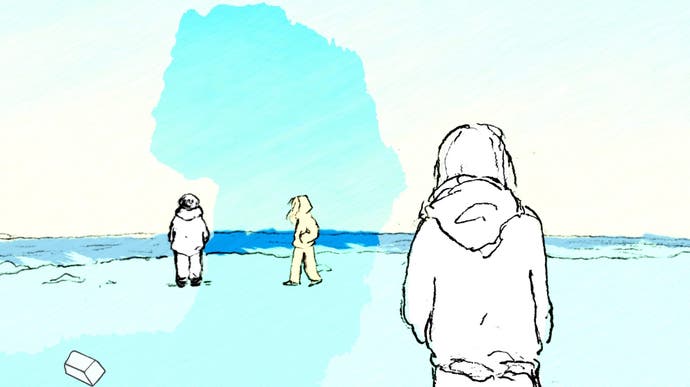Erasing Erasure in If Found…
An Irish indie game about growing up, coming out, and coming home.
Erasure - the experience of being rendered invisible - is a depressingly common facet of queer experience. For those who live and love beyond the boundaries of cis-heteronormative society, recognition, be it legal, social, or cultural, can be hard to come by, and visibility, when it does come, is often plagued with risks. This experience can be particularly pronounced in a culture like Ireland, which, for much of its existence as an independent nation, premised its national identity upon an often noxious blend of piety and purity. It is perhaps not surprising then that If Found..., the new interactive visual novel from Dublin-based developers DREAMFEEL and Annapurna Interactive, should take erasure as its core gameplay mechanic. What is pleasantly surprising, however, is how the developers have implemented that mechanic, and the story they have used it to tell.
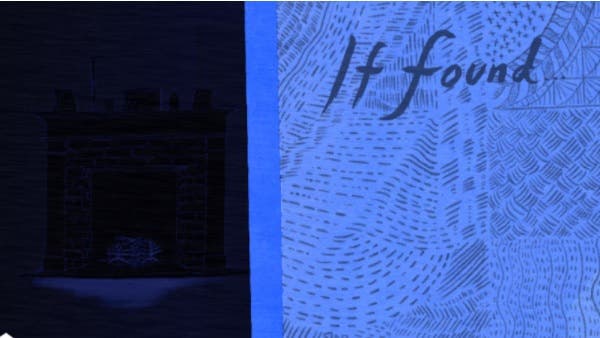
Set in the dying days of 1993 on Achill, a small island on the west coast of Ireland, If Found... tells the story of Kasio, a twenty-three-year-old, queer, trans woman and aspirant physicist who has returned to her family home from university in Dublin for the Christmas period. The home to which Kasio has returned is stifling - 'no-one has drawn breath here since da's wake,' she notes - and, as the days wear on, Kasio must weather the passive hostility of her mother, who 'can't understand this whole 'alternative' thing' and wants her to abandon her studies and get a 'sensible' job, and the active hostility of her brother, Fergal, who derides her as a selfish 'freak'. A tentative refuge is offered by her former schoolmate Colum who, along with his partner Jack and their friend 'Shans', form Bandshee, one of the 'heaviest groups in Mayo' and the possessors of my second-favourite groan-worthy pun band name in the game. The members of Bandshee squat in the 'big house' - the increasingly decrepit remains of an aristocratic pile once occupied by members of the Anglo-Irish gentry and now owned by 'the nuns' - and, through the company and acceptance of this chosen family, Kasio slowly begins to find a place for herself again on the island. However, when her increasingly close attachment to 'Shans' (an islander of Indian heritage who has never felt fully at home either on Achill or in their own masculinity) becomes complicated, Kasio finds herself facing the New Year homeless and alone. Oh, and, unless astronaut and astrophysicist, Dr Cassiopeia, and Mayo accountant, McHugh, can stop it, a black hole triggered by 'the Anomaly' (an event closely tied to Kasio's journey of self-understanding) might destroy the universe as we know it. I probably should have led with that...
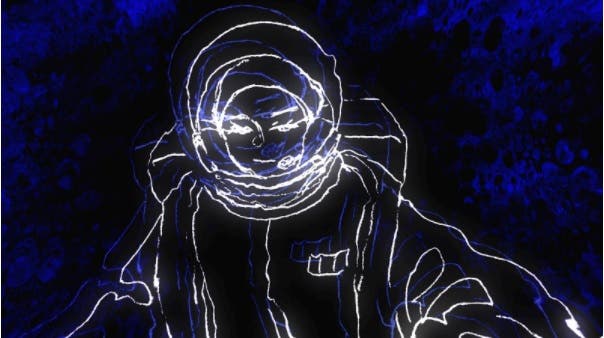
So, where does erasure fit in to all this? Well, the primary means by which the player uncovers and navigates Kasio's narrative is by erasing page after page of her abandoned diary. As the player assumes control of the game and, implicitly, takes possession of Kasio's diary (hence the game's title), their cursor takes the form of an eraser, which they use to rub out layer after layer of Kasio's writing, scribblings, and sketches. This sounds unsettlingly destructive, and, to an extent, it is. It feels almost sacrilegious to erase Kasio's most personal thoughts (and lead artist Liadh Young's gorgeous illustrations), and this sense of consequence helps to elevate what might otherwise have been a passive means by which to advance the narrative into something that meaningfully implicates the player in the game and its world. Crucially, however, rather than consigning Kasio and her friends to invisibility, the more the player erases, the more clearly (and queerly) Kasio and her friends come into view. Where once Irish culture concealed, marginalised, and silenced its gendered and sexual minorities, If Found... places them front-and-centre, offering a delicate, subtle, and painfully well-observed portrait of queer life playing out in what has traditionally been heralded as one of the heartlands of 'authentic Irish identity.
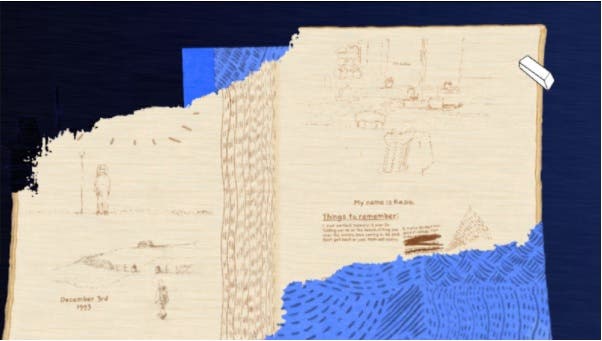
As a queer Irish historian - both in the sense of being someone who explores the history of queerness in Ireland, and in the sense of being an Irish historian who is, themselves, queer - I found this mechanic particularly resonant. The ways in which the player navigates, advances, and assembles Kasio's story - leafing through her diary, deciphering passages that have been scribbled out or written over, teasing words and images into tentative legibility - feels incredibly close to the work I and others engage in when trying to assemble a picture of the lives of queer people who have gone before us. The sense of duty and responsibility that comes with this act of reclamation becomes even more movingly pronounced in the game's final chapters, in which the core 'eraser' mechanic is inverted in a way that it feels like a spoiler to reveal, but which lands with all the force of a twist ending.
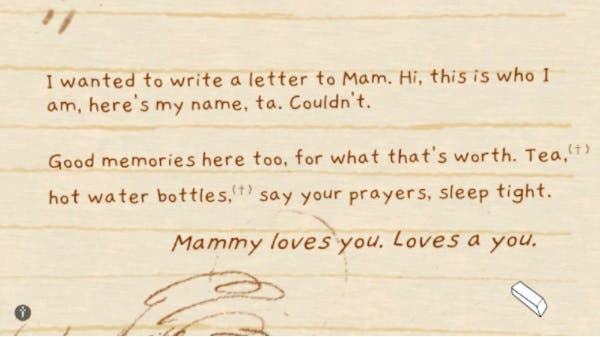
This is all by way of saying that, even if it weren't particularly good, If Found... would still be an important contribution to both queer gaming and Irish culture that I would recommend to those affected by the themes it addresses. The fact that it is really very good indeed makes it an important contribution to queer gaming and Irish culture that I would happily recommend to anyone.
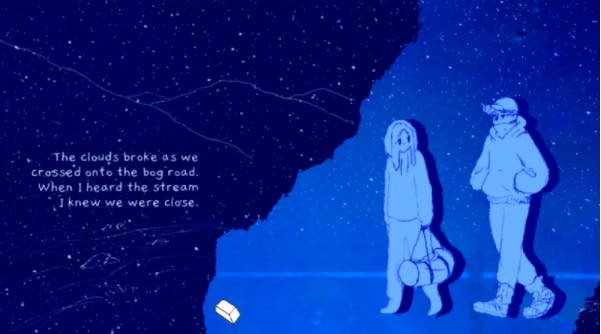
The first thing that strikes one upon booting up If Found... is how gorgeous it is. In If Found..., indie auteur Llaura McGee (the head of DREAMFEEL and the game's lead designer) and her team have crafted one of the most unique and visually arresting games of 2020. Unlike other interactive novels, which sometimes come off feeling inert and static, If Found... positively buzzes with life, energy, and character, to the point where screenshots can't really do it justice. Backgrounds shift and pulse, expressionistically underscoring Kasio's emotional state or punctuating a dramatic moment, certain words crackle with significance or quiver with excitement, and naturalistic scenes of rural Irish domesticity suddenly collapse into a black hole or warp into a shimmering cosmic void. The game's art style, which combines everything from pencil sketches and delicate water-colours to lurid pulses of hyper-saturated, sci-fi psychedelia, by all rights shouldn't form a coherent visual vocabulary. But it does, to consistently mesmerising effect. If Found... is available for iPhone and iPad, and the more intimate and tactile engagement this facilitates definitely enriches aspects of the game, but, to do full justice to its aesthetic, I recommend playing the PC version on as large and crisp a display as possible.
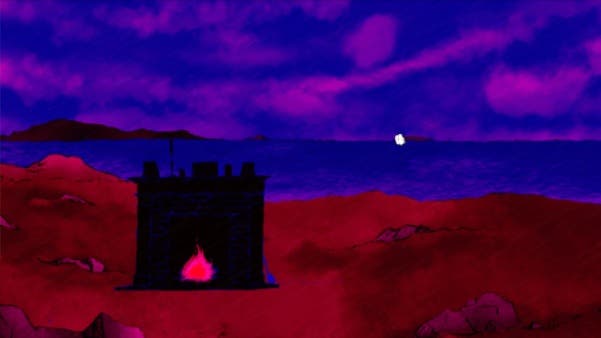
I also recommend wearing a decent pair of headphones. Perhaps unsurprisingly for a game whose core cast includes a college band, music and audio design are absolutely central to If Found...'s immersive atmosphere and beautifully evoked sense of character and place. The lion's share of the soundtrack is provided by composer, producer, and sound designer 2 Mello, who combines low-fi synth washes, dissonant keyboards, urgent electronica, and distorted echoes of Irish traditional music to evoke Kasio's often turbulent mood and fuse the grounded world of Achill with the extra-terrestrial vistas of the game's sci-fi frame narrative. If Found...'s more meditative soundscapes are provided by non-binary composer, sound artist, and self-proclaimed 'remorseless noise person', Eli Rainsberry, whose glass harp and plangent guitar lend a haunting, spacey air to several of the game's most introspective moments.
Punctuating these original compositions are some fantastic needle-drops from hidden gems of Irish post-punk like Operating Theatre and The Threat, whose 'High Cost of Living' underscores Bandshee's exhilarating first gig, and contemporary folk fusion collective Ensemble Ériu, who provide a concluding track that is basically precision-engineered to make Irish people cry. It's the sort of soundtrack that you're going to want to download and listen to on its own terms (though, also the sort of soundtrack you should be careful about listening to in public if you well up as easily as I do...)
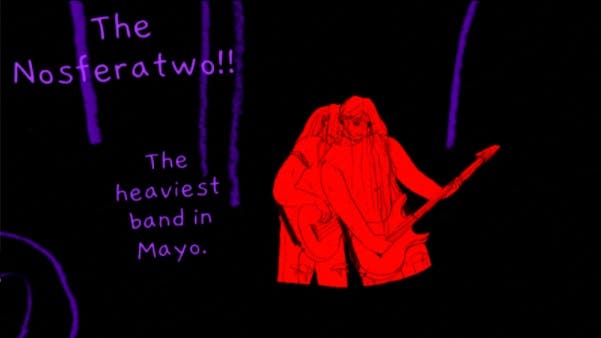
For those whose lives it reflects, If Found... will feel like a hand reaching out of the darkness to take theirs; something quietly but profoundly affirming that offers a rare oasis of visibility in a medium where queer erasure is still often the norm. But I believe the game has a huge amount to offer even to those whose background and life experiences are quite different from those of Kasio and her friends. Asked why he wrote obsessively about his native Dublin even after having lived away from it for decades, the great Irish modernist James Joyce replied: 'For myself, I always write about Dublin, because if I can get to the heart of Dublin, I can get to the heart of all the cities of the world. In the particular is contained the universal.' In its sensitivity to the particulars of its Irish setting and the queer lives it narrates, If Found... bears out this adage, telling a story which resonates far beyond the borders of any particular island or sub-culture; a story about growing up, about acceptance, about the families into which we are born, and the families we fashion for ourselves; in short, a story about home. You may find that, in telling that story, If Found... leaves a mark on you that proves difficult to erase.
Resources
A definitive queer history of Ireland has yet to be written, with Irish trans experience being particularly conspicuous by its absence from the historiography to-date. At present, the best resources on the history of gendered and sexual minorities in the modern nation are Brian Lacey's Terrible Queer Creatures: Homosexuality in Irish History (2008) and Diarmaid Ferriter's monumental Occasions of Sin: Sex and Society in Modern Ireland (2009). If you would like to support trans rights in Ireland or are an Irish trans person in need of information and resources, check out the Transgender Equality Network Ireland (TENI) or some of the organisations listed here. If you're a Gaeilgeoir [Irish speaker] who wants to expand their queer vocabulary, or an Anglophone queer person who'd like to acquire a cúpla focail as Gaeilge [few words of Irish], the Union of Students in Ireland's An Foclóir Aiteach [the queer dictionary] is a great place to start.
